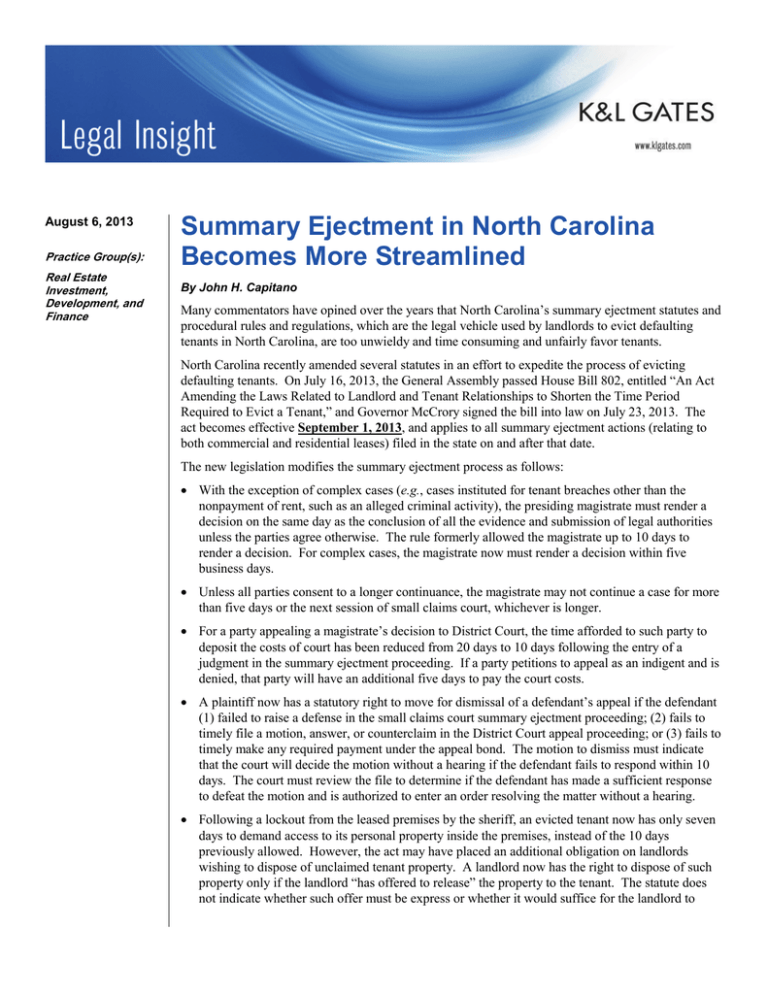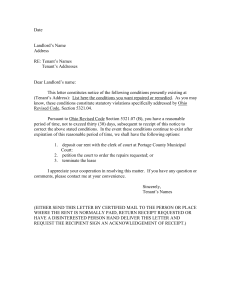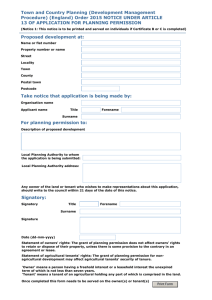
August 6, 2013
Practice Group(s):
Real Estate
Investment,
Development, and
Finance
Summary Ejectment in North Carolina
Becomes More Streamlined
By John H. Capitano
Many commentators have opined over the years that North Carolina’s summary ejectment statutes and
procedural rules and regulations, which are the legal vehicle used by landlords to evict defaulting
tenants in North Carolina, are too unwieldy and time consuming and unfairly favor tenants.
North Carolina recently amended several statutes in an effort to expedite the process of evicting
defaulting tenants. On July 16, 2013, the General Assembly passed House Bill 802, entitled “An Act
Amending the Laws Related to Landlord and Tenant Relationships to Shorten the Time Period
Required to Evict a Tenant,” and Governor McCrory signed the bill into law on July 23, 2013. The
act becomes effective September 1, 2013, and applies to all summary ejectment actions (relating to
both commercial and residential leases) filed in the state on and after that date.
The new legislation modifies the summary ejectment process as follows:
• With the exception of complex cases (e.g., cases instituted for tenant breaches other than the
nonpayment of rent, such as an alleged criminal activity), the presiding magistrate must render a
decision on the same day as the conclusion of all the evidence and submission of legal authorities
unless the parties agree otherwise. The rule formerly allowed the magistrate up to 10 days to
render a decision. For complex cases, the magistrate now must render a decision within five
business days.
• Unless all parties consent to a longer continuance, the magistrate may not continue a case for more
than five days or the next session of small claims court, whichever is longer.
• For a party appealing a magistrate’s decision to District Court, the time afforded to such party to
deposit the costs of court has been reduced from 20 days to 10 days following the entry of a
judgment in the summary ejectment proceeding. If a party petitions to appeal as an indigent and is
denied, that party will have an additional five days to pay the court costs.
• A plaintiff now has a statutory right to move for dismissal of a defendant’s appeal if the defendant
(1) failed to raise a defense in the small claims court summary ejectment proceeding; (2) fails to
timely file a motion, answer, or counterclaim in the District Court appeal proceeding; or (3) fails to
timely make any required payment under the appeal bond. The motion to dismiss must indicate
that the court will decide the motion without a hearing if the defendant fails to respond within 10
days. The court must review the file to determine if the defendant has made a sufficient response
to defeat the motion and is authorized to enter an order resolving the matter without a hearing.
• Following a lockout from the leased premises by the sheriff, an evicted tenant now has only seven
days to demand access to its personal property inside the premises, instead of the 10 days
previously allowed. However, the act may have placed an additional obligation on landlords
wishing to dispose of unclaimed tenant property. A landlord now has the right to dispose of such
property only if the landlord “has offered to release” the property to the tenant. The statute does
not indicate whether such offer must be express or whether it would suffice for the landlord to
Summary Ejectment in North Carolina Becomes More
Streamlined
simply be ready and willing to allow retrieval of the personal property if demanded by the tenant
within that seven day period.
• The time within which the sheriff must enforce a writ of possession has been reduced from seven
days to five days.
K&L Gates lawyers are ready to assist with any questions that arise under the amendments to the
statutes.
Authors:
John H. Capitano
jack.capitano@klgates.com
+1.704.331.7409
Anchorage Austin Beijing Berlin Boston Brisbane Brussels Charleston Charlotte Chicago Dallas Doha Dubai Fort Worth Frankfurt
Harrisburg Hong Kong Houston London Los Angeles Melbourne Miami Milan Moscow Newark New York Orange County Palo Alto Paris
Perth Pittsburgh Portland Raleigh Research Triangle Park San Diego San Francisco São Paulo Seattle Seoul Shanghai Singapore Spokane
Sydney Taipei Tokyo Warsaw Washington, D.C. Wilmington
K&L Gates practices out of 48 fully integrated offices located in the United States, Asia, Australia, Europe, the
Middle East and South America and represents leading global corporations, growth and middle-market companies,
capital markets participants and entrepreneurs in every major industry group as well as public sector entities,
educational institutions, philanthropic organizations and individuals. For more information about K&L Gates or its
locations, practices and registrations, visit www.klgates.com.
This publication is for informational purposes and does not contain or convey legal advice. The information herein should not be used or relied upon in
regard to any particular facts or circumstances without first consulting a lawyer.
©2013 K&L Gates LLP. All Rights Reserved.
2







